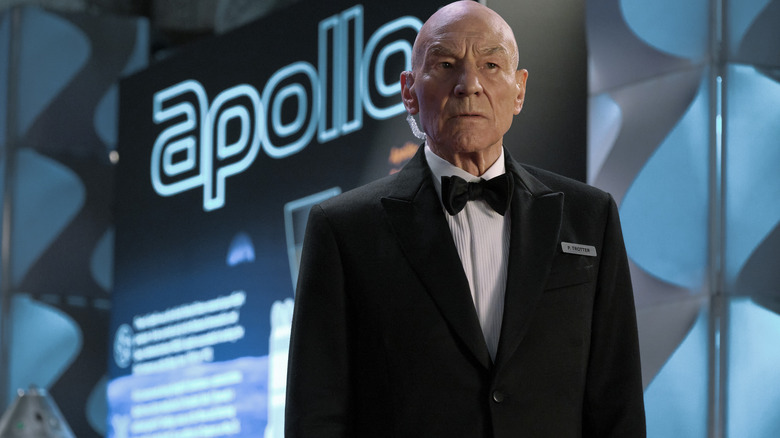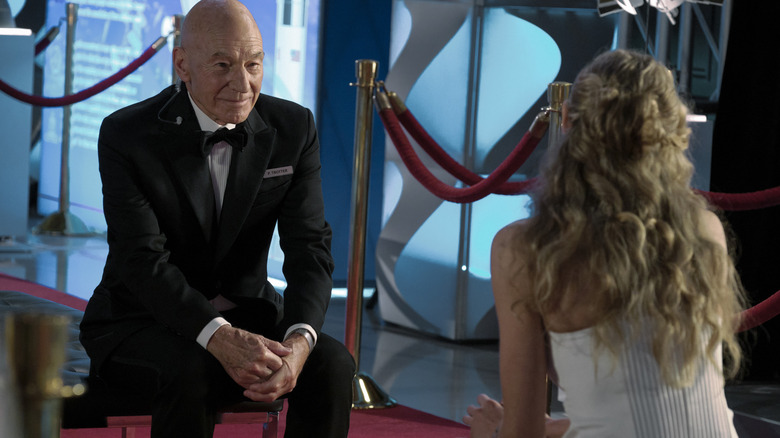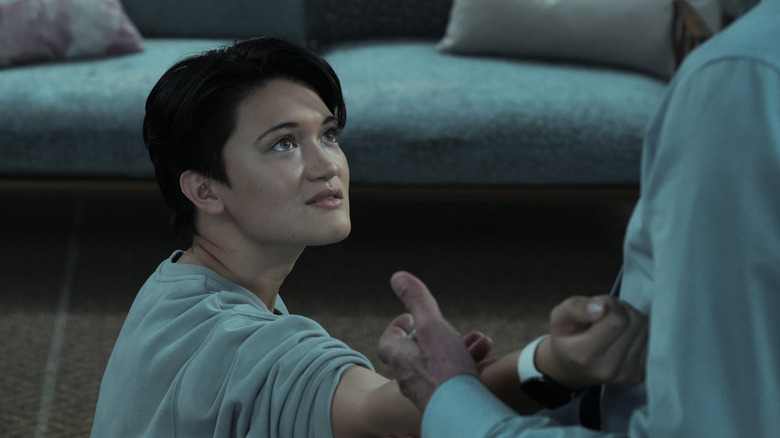A 30-Second Pep Talk Prevents Generations Of Fascism In Episode 6 Of Star Trek: Picard | SlashFilm Reviews

Last week's recap of "Star Trek: Picard" was a lamentation that the series habitually skews away from philosophy and theme and pushes disappointingly headlong into the more pedestrian storytelling fundamentals of plot and action. Not that a thematically lightweight-yet-fascinating plot cannot carry an episode of "Star Trek" — the parallels between this season of "Picard" and the equally plot-forward film "Star Trek IV: The Voyage Home" are myriad — but in so doing, the showrunners have left behind a vital element of "Trek" that has always made it fascinating: It's wrestling with ideas. "Star Trek IV," while lightweight, had the good taste to make extinction and ecology the center of its story. There are lines of dialogue about the moral horror of hunting a species to extinction. Preachy? Perhaps. Effective? Certainly.
Another antecedent to this season of "Picard" is "All Good Things...," the final episode of "Star Trek: The Next Generation." In that episode, the trickster god Q (John De Lanice) caused Capt. Picard (Patrick Stewart) to become unstuck in time à la "Slaughterhouse-Five" and experience his past, his present, and his future alternately. In that episode, Picard discovers a spatial phenomenon that grows larger as it travels backward through time, eventually growing so large that it interrupts the beginning of life on Earth 3.5 billion years ago. Picard also discovers that he was the one who accidentally created the phenomenon in three separate time periods simultaneously. It's clearer when you watch the episode. "All Good Things..." is about reckoning with the unforeseen damage of your actions, and confronting the paradoxes of causality loops. It's a good episode of TV.
Ecology is not at the center of "Star Trek: Picard," nor is a causality loop. Not really. In "Two for One," the sixth episode of the second season, Picard and company have traveled back in time to prevent the flashpoint that would lead to a fascist future. One would think — with "All Good Things..." in mind — that Picard's own temporal tinkering would eventually be the thing to instigate fascism. A fun ironic twist: Picard's own need to help and prevent darkness would be the thing to cause it. That is not the case. It was revealed in last week's "Fly Me to the Moon" and made more explicit in "Two for One," that Q, stripped of his powers, is deliberately sabotaging human history by: A) Posing as a psychiatrist for astronaut Renée Picard (Penelope Mitchell) and convincing her to abandon her space mission, robbing humanity of some vague sense of togetherness, and B) Hiring Adam Soong (Brent Spiner) a progenitor of Data's creator, to assassinate Renée Picard if that doesn't work. No irony. No poetry. No sense of dark inevitability. Just Q doing — essentially — spy stuff. How uninspired.
The Fancy Dress Ball

The bulk of the action in "Two for One" takes place at a fancy dress ball that our protagonists have infiltrated. Capt. Rios (Santiago Cabrera) was freed from ICE by Raffi (Michelle Hurd) and Seven (Jeri Ryan) just in time to join. Raffi points out to Rios that he is glowing, having fallen in love with Dr. Ramirez (Sol Rodriguez). The Watcher (Orla Brady) is along for the ride. Dr. Jurati (Alison Pill), having had her mind infected by the Borg Queen (Annie Wersching), has out-loud conversations with her new mental passenger, and the two vie for dominance of Dr. Jurati's body.
The rules about The Borg have changed aggravatingly frequently. In "NextGen," the Borg would kidnap a victim and put them through a long, complicated surgical process to assimilate them; there were implants to implant and memories to suppress. In "Star Trek: First Contact," it was revealed that a victim could be assimilated after a mere injection of Borg nanotech that would infiltrate their bloodstream. In "Star Trek: Voyager," we learned that one can be assimilated but retain their individuality, given the proper preparation. In "Picard," we see that the Borg Queen cannot merely infiltrate Dr. Jurati's body, but required some sort of psychic bond and the right amount of endorphins. In a truly silly twist, the Borg Queen convinces Dr. Jurati to sing for a crowd, and the endorphins caused by the room's applause are what allows the cyborg to finally assimilate Dr. Jurati. A complicated plot for an evil half-robot supervillain.
Jean-Luc Picard, meanwhile, has to track down Renée — and this is the climactic moment that separates a fascist future from a hopeful one — and have a 30-second conversation with her about how it's okay to be afraid. That fear is a mark of intelligence. So yes, gentle viewers, the notion that will prevent a fascist future was something stated in similar words from "Paw Patrol: The Movie." Picard is Ryder, Renée is Chase, Dr. Jurati is Marshall, and the Borg Queen is Mayor Humdinger.
Picard Is Still A Golem

Picard is successful. It seems that Renée will take to space, inspire this generation to keep moving forward with optimism, and be the catalyst for Roddenberry's future of hope. With four additional episodes in season two, however, an additional crisis must also be addressed. This will come in the form of the above-mentioned Adam Soong, with whom Q has been scheming. Q has not only hired Soong to assassinate Renée, but to tinker with human genes. The Eugenics Wars are a large part of "Star Trek" mythology — Khan was a cryogenically frozen relic of that war — and it seems that Adam Soong may have something to do with starting them.
Soong fails at his assassination attempt, accidentally running over Picard instead. Picard, injured and unconscious, is taken to Dr. Ramirez, who uses a defibrillator to restart his injured heart. There are cracks about how he has had "all the transplants," and the defibrillator shorts out when Dr. Ramirez uses it. This confirms, unfortunately, that Picard is still an android golem living in the same artificial body his consciousness was shunted into at the conclusion of season one. Seven was missing her Borg implants when Q teleported her into the fascist timeline, leading to the natural assumption that every member of the cast was occupying new bodies in an alternate timeline. As such, Picard was presumably now once again flesh and blood. That assumption was incorrect, and Picard is indeed an android. Why Q removed Seven's Borg implants but did not replace Picard's body is ... well, that's one for the philosophers.
A New Silly Plot Enters

Meanwhile, Adam Soong's daughter Kore (Isa Briones, who played multiple androids in the show's first season) has introduced a new, unrelated plot that will undoubtedly have to be addressed in the show's final four episodes. Kore suffers from an unnamed genetic ailment that prevents her from breathing unfiltered air or standing in direct sunlight. She spends most of her time in a posh basement room only occasionally talking to her father. When she goes snooping through Adam's computer, she finds several online articles on how her father was a mad scientist whose wild genetic experiments cost him his livelihood and credibility in the medical community. She also finds a series of her own childhood photos ... that she does not remember taking. It turns out Kore is merely the latest in a string of failed clones that Soong has been creating for, no doubt, nefarious purposes.
Surely, say I, the notion of a mad scientist using shady genetic experimentation would have been cause enough to suspect a fascist future. It appears the Renée plot, the Watcher, etc., were but window-dressing to a more direct plot about Data's great-great-etc.-grandfather deliberately causing a dark timeline. A more interesting confrontation, surely I say again, would have been Picard facing off against a man who looks like an old officer of his, discussing the ethics of genetic manipulation.
"Picard" is overwritten to the point of nonsense. And while I do appreciate the setting, the overall idea for the plot, and some of the characters, I find "Picard" is still merely stumbling along.
Yet to be resolved: Dr. Jurati possessed by the Borg Queen, the flashbacks with Picard's mother, and Adam Soong. I can't say I have much faith in any potentially clever denouement.
Read this next: The 14 Best Sci-Fi Shows On Amazon Prime
The post A 30-Second Pep Talk Prevents Generations of Fascism in Episode 6 of Star Trek: Picard appeared first on /Film.
https://ift.tt/1Ehgvmf Witney Seibold
Comments
Post a Comment